Early life of Winston Churchill
The early life of Winston Churchill covers the period from his birth on 30 November 1874 to 31 May 1904 when he formally crossed the floor of the House of Commons, defecting from the Conservative Party to sit as a member of the Liberal Party. Churchill had mixed English and American parentage. He was born at Blenheim Palace in Oxfordshire, England, as the elder son of Lord and Lady Randolph Churchill. He attended Harrow School and the Royal Military Academy, Sandhurst. After joining the British Army in 1895, he saw action in British India, the Anglo-Sudan War, and the Second Boer War, gaining fame as a war correspondent and by writing books about his campaigns. He began his political career as a member of the Conservative Party and was first elected as a Member of Parliament (MP), representing the Oldham constituency, on 24 October 1900. Dissatisfaction with Conservative government policy caused him to resign his party membership and join the Liberals in 1904.
Childhood and schooling: 1874–1895
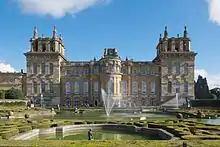
Churchill was born at his family's ancestral home, Blenheim Palace in Oxfordshire, on 30 November 1874,[1] at which time the United Kingdom was the dominant world power.[2] Direct descendants of the Dukes of Marlborough, his family were among the highest levels of the British aristocracy,[3] and thus he was born into the country's governing elite.[4] His paternal grandfather, John Spencer-Churchill, 7th Duke of Marlborough, had been a Member of Parliament (MP) for ten years, a member of the Conservative Party who served in the government of Prime Minister Benjamin Disraeli.[5] His own father, Lord Randolph Churchill, had been elected Conservative MP for Woodstock in 1873.[6] His mother, Jennie Churchill was a daughter of Leonard Jerome, an American businessman.[7][8] The couple had met in August 1873, and were engaged three days later, marrying at the British Embassy in Paris in April 1874.[9] The couple lived beyond their income and were frequently in debt;[10] according to the biographer Sebastian Haffner, the family were "rich by normal standards but poor by those of the rich".[11]
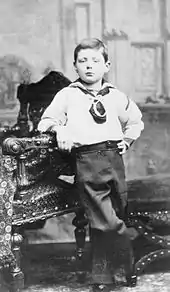
John Spencer-Churchill was appointed Viceroy of Ireland in 1876, with Randolph as his private secretary, resulting in the Churchill family's relocation to Dublin, when the entirety of Ireland was part of the United Kingdom.[13] It was here that Jennie's second son, Jack, was born in 1880.[14] There has been speculation that Randolph was not his biological father.[15] Throughout much of the 1880s, Randolph and Jennie were effectively estranged. During this time she had many suitors.[16] Churchill had virtually no relationship with his father.[17] Referring to his mother, Churchill later stated that "I loved her dearly—but at a distance".[18] His relationship with Jack was warm.[15] In Dublin, the brothers were cared for primarily by their nanny, Elizabeth Everest.[19] Churchill nicknamed her "Woomany",[20] and later wrote that "She had been my dearest and most intimate friend during the whole of the twenty years I had lived".[21]
Aged seven, he began boarding at St. George's School in Ascot, Berkshire; he hated it, did poorly academically, and regularly misbehaved.[22] Visits home were to Connaught Place in London, where his parents had settled,[23] while they also took him on his first foreign holiday, to Gastein in Austria-Hungary.[24] As a result of poor health, in September 1884 he moved to Brunswick School in Hove; there, his academic performance improved but he continued to misbehave.[25] He narrowly passed the entrance exam which allowed him to begin studies at the elite Harrow School in April 1888.[26] There, his academics remained high—he excelled particularly in history—but teachers complained that he was unpunctual and careless.[27] He wrote poetry and letters which were published in the school magazine, Harrovian,[28] and won a fencing competition.[29] His father insisted that he be prepared for a career in the military, and so Churchill's last three years at Harrow were spent in the army form.[30] He performed poorly in most of his exams.[31]
On a holiday to Bournemouth in January 1893, Churchill fell and was knocked unconscious for three days.[32] In March he took a job at a cram school in Lexham Gardens, South Kensington,[32] before holidaying in Switzerland and Italy that summer.[33] After two unsuccessful attempts to gain admittance to the Royal Military Academy, Sandhurst, he succeeded on his third attempt.[34] There, he was accepted as a cadet in the cavalry,[35] starting his education in September 1893.[31] In August 1894 he and his brother holidayed in Belgium,[36] and he spent free time in London, joining protests at the closing of the Empire Theatre, which he had frequented.[37] His Sandhurst education lasted for 15 months; he graduated in December 1894.[31] Shortly after Churchill finished at Sandhurst, in January 1895, his father died; this led Churchill to adopt the belief that members of his family inevitably died young.[38]
Cuba, India, and Sudan: 1895–1899
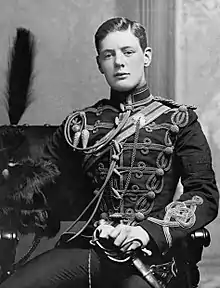
In February 1895, Churchill was commissioned as a second lieutenant in the 4th Queen's Own Hussars regiment of the British Army, based at Aldershot.[40] In July, he rushed to Crouch Hill, North London to sit with Everest as she lay dying, subsequently organising her funeral.[41] Churchill was eager to witness military action and used his mother's influence to try to get himself posted to a war zone.[42] In the autumn of 1895, he and Reginald Barnes traveled to Cuba to observe its war of independence; they joined Spanish troops attempting to suppress independence fighters and were caught up in several skirmishes.[43] He also spent time in New York City, staying with the wealthy politician Bourke Cockran, who profoundly influenced the young Churchill.[44] Churchill admired the United States, writing to his brother that it was "a very great country" and telling his mother "what an extraordinary people the Americans are!"[45]
With the Hussars, Churchill arrived in Bombay, British India, in October 1896.[46] They were soon transferred to Bangalore, where he shared a bungalow with Barnes.[47] Describing India as a "godless land of snobs and bores",[48] Churchill remained there for 19 months, during the course of which he made three visits to Calcutta, expeditions to Hyderabad and the North West Frontier, and two visits back to Britain.[49] Believing himself poorly educated, he began a project of self-education,[50] reading the work of Plato, Adam Smith, Charles Darwin, and Henry Hallam.[51] Most influential for him were Edward Gibbon's The History of the Decline and Fall of the Roman Empire, Winwood Reade's The Martyrdom of Man, and the writings of Thomas Babington Macaulay.[52]
Interested in British parliamentary affairs,[53] in one letter he declared himself "a Liberal in all but name", but added that he could never endorse the Liberal Party's support for Irish home rule.[54] Instead, he allied himself to the Tory democracy wing of the Conservative Party, and on a visit home gave his first public speech for the Conservative's Primrose League in Bath.[55] Reflecting a mix of reformist and conservative perspectives, he supported the promotion of secular, non-denominational education while opposing women's suffrage, referring to the Suffragettes as "a ridiculous movement".[56]
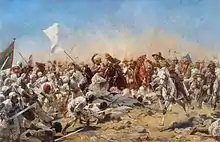
Churchill decided to join Bindon Blood's Malakand Field Force in its campaign against Mohmand rebels in the Swat Valley of Northwest India.[57] Blood agreed on the condition that Churchill be assigned as a journalist; to ensure this, he gained accreditation from The Pioneer and The Daily Telegraph, for whom he wrote regular updates.[58] In letters to family, he described how both sides in the conflict slaughtered each other's wounded, although he omitted any reference to such actions by British troops in his published reports.[59] He remained with the British troops for six weeks before returning to Bangalore in October 1897.[60] There, he wrote his first book, The Story of the Malakand Field Force, which was published by Longman to largely positive reviews.[61] He also wrote his only work of fiction, Savrola, a political adventure story set in an imagined Balkan kingdom. It was serialised in Macmillan's Magazine between May–December 1899 before appearing in book form.[62]
While in Bangalore in the first half of 1898, Churchill explored the possibility of joining Herbert Kitchener's military campaign in the Sudan.[63] Kitchener was initially reluctant, claiming that Churchill was simply seeking publicity and medals.[64] After spending time in Calcutta, Meerut, and Peshawar, Churchill sailed back to England from Bombay in June.[65] There, he used his contacts—including a visit to the Prime Minister Lord Salisbury at 10 Downing Street—to get himself assigned to Kitchener's campaign.[66] He agreed that he would write a column describing the events for The Morning Post.[67] Arriving in Egypt, he joined the 21st Lancers at Cairo before they headed south along the River Nile to take part in the Battle of Omdurman against the army of Sudanese leader Abdallahi ibn Muhammad.[68] Churchill was critical of Kitchener's actions during the war, particularly the latter's unmerciful treatment of enemy wounded and his desecration of Muhammad Ahmad's tomb in Omdurman.[69] Following the battle, Churchill gave skin from his chest for a graft for an injured officer.[70] Back in England by October, Churchill wrote an account of the campaign, published as The River War in November 1899.[71]
Politics and South Africa: 1899–1901
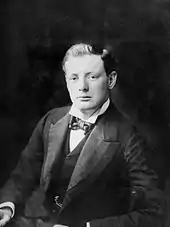
Seeking a parliamentary career, Churchill pursued political contacts and gave addresses at three Conservative Party meetings.[73] At this point he courted Pamela Plowden; although a relationship did not ensue, they remained lifelong friends.[74] In December he returned to India for three months, largely to indulge his love of the game polo.[74] While in Calcutta, he stayed in the home of Viceroy George Nathaniel Curzon.[75] On the journey home, he spent two weeks in Cairo, where he was introduced to the Khedive Abbas II,[76] before arriving in England in April.[77] He refocused his attention on politics, addressing further Conservative meetings and networking at events such as a Rothschild's dinner party.[78] He was selected as one of the two Conservative parliamentary candidates at the June 1899 by-election in Oldham, Lancashire.[79] While campaigning in Oldham, Churchill referred to himself as "a Conservative and a Tory Democrat".[80] Although the Oldham seats had previously been held by the Conservatives, the election was a narrow Liberal victory.[81]
Anticipating the outbreak of the Second Boer War between Britain and the Boer Republics, Churchill sailed from Southampton to South Africa as a journalist writing for the Daily Mail and Morning Post.[82] From Cape Town, in October he travelled to the conflict zone near Ladysmith, then besieged by Boer troops, before spending time at Estcourt and then heading for Colenso.[83] After his train was derailed by Boer artillery shelling, he was captured as a prisoner of war and interned in a Boer POW camp in Pretoria.[84] In December, Churchill escaped the prison over the latrine wall. Churchill stowed aboard a freight train and later hid within a mine, shielded by the sympathetic English mine owner. Wanted by the Boer authorities, he again hid aboard a freight train and travelled to safety in Portuguese East Africa.[85]
Sailing to Durban, Churchill found that his escape had attracted much publicity in Britain.[86] In January 1900 he was appointed a lieutenant in the South African Light Horse regiment, joining Redvers Buller's fight to relieve the Siege of Ladysmith and take Pretoria.[87] In his writings during the campaign, he chastised British hatred for the Boer, calling for them to be treated with "generosity and tolerance" and urging a "speedy peace";[88] after the war he called for the British to be magnanimous in victory.[89] He was among the first British troops into Ladysmith and Pretoria. He and his cousin, the Duke of Marlborough, were able to get ahead of the rest of the troops in Pretoria, where they demanded and received the surrender of 52 Boer prison camp guards.[90] After the victory in Pretoria, he returned to Cape Town and sailed for Britain in July. In May, while he had still been in South Africa, his Morning Post despatches had been published as London to Ladysmith via Pretoria, which sold well.[91]
Arriving in Southampton in July 1900,[92] Churchill rented a flat in London's Mayfair,[92] using it as his base for the next six years.[93] He stood again as one of the Conservative candidates at Oldham in the October 1900 general election,[94] securing a narrow victory to become an MP at age 25.[95] In the same month, he published Ian Hamilton's March, a book about his South African experiences,[96][97] which became the focus of a lecture tour in November through Britain, America and Canada. MPs were unpaid and the tour was a financial necessity. In America, Churchill met Mark Twain, President McKinley and Vice President Theodore Roosevelt; he did not get on well with Roosevelt.[98] In spring 1901 he gave more lectures in Paris, Madrid and Gibraltar.[99]
Conservative MP: 1901–1904
.jpg.webp)
In February 1901, Churchill took his seat in the House of Commons, where his maiden speech gained widespread press coverage.[100] He associated with a group of Conservatives known as the Hughligans,[101] although he was critical of the Conservative government on various issues. He condemned the British execution of a Boer military commandant,[102] and voiced concerns about the levels of public expenditure;[103] in response, Prime Minister Arthur Balfour asked him to join a parliamentary select committee on the topic.[104] He opposed increases to army funding, suggesting that any additional military expenditure should go to the navy.[105] This upset the Conservative front bench but gained support from Liberals.[106] He increasingly socialised with senior Liberals, particularly Liberal Imperialists like H. H. Asquith.[106] In this context, he later wrote, he "drifted steadily to the left" of British parliamentary politics.[102] He privately considered "the gradual creation by an evolutionary process of a Democratic or Progressive wing to the Conservative Party",[107] or alternately a "Central Party" to unite the Conservatives and Liberals.[108]
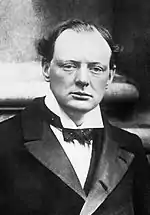
By 1903, Churchill was increasingly dissatisfied with the Conservatives, in part due to their promotion of economic protectionism, but also because he had attracted the animosity of many party members and was likely aware that this might have prevented him gaining a Cabinet position under a Conservative government. The Liberal Party was then attracting growing support, and so his defection in 1904 may have also have been influenced by personal ambition.[109] In a 1903 letter, he referred to himself as an "English Liberal ... I hate the Tory party, their men, their words and their methods".[110] In the House of Commons, he increasingly voted with the Liberal opposition against the government.[111] In February 1903, Churchill was among 18 Conservative MPs who voted against the government's increase in military expenditure.[112] He backed the Liberal vote of censure against the use of Chinese indentured labourers in South Africa, and in favour of a Liberal bill to restore legal rights to trade unions.[111] His April 1904 parliamentary speech upholding the rights of trade unions was described by the pro-Conservative Daily Mail as "Radicalism of the reddest type".[113] In May 1903, Joseph Chamberlain, the Secretary of State for the Colonies, called for the introduction of tariffs on goods imported into the British Empire from outside; Churchill became a leading Conservative voice against such economic protectionism.[114] Describing himself as a "sober admirer" of "the principles of Free Trade",[115] in July he was a founding member of the anti-protectionist Free Food League.[116] In October, Balfour's government sided with Chamberlain and announced protectionist legislation.[117]
Churchill's outspoken criticism of Balfour's government and imperial protectionism, coupled with a letter of support he sent to a Liberal candidate in Ludlow, angered many Conservatives.[118] In December 1903, the Oldham Conservative Association informed him that it would not support his candidature in the next general election.[119] In March 1904, Balfour and the Conservative front bench walked out of the House of Commons during one of his speeches.[120] In May he expressed opposition to the government's proposed Aliens Bill, which was designed to curb Jewish migration into Britain.[121] He stated that the bill would "appeal to insular prejudice against foreigners, to racial prejudice against Jews, and to labour prejudice against competition" and expressed himself in favour of "the old tolerant and generous practice of free entry and asylum to which this country has so long adhered and from which it has so greatly gained".[121] On 31 May 1904, he crossed the floor, defecting from the Conservatives to sit as a member of the Liberal Party in the House of Commons.[122]
References
Citations
- Jenkins 2001, p. 5.
- Best 2001, p. 1.
- Gilbert 1991, p. 1; Jenkins 2001, pp. 3, 5.
- Best 2001, p. 2; Haffner 2003, p. 2.
- Jenkins 2001, p. 4; Addison 2005, pp. 7–8.
- Gilbert 1991, p. 1; Best 2001, p. 3; Jenkins 2001, p. 4; Robbins 2014, p. 2.
- Anita Leslie. Jennie: The Life of Lady Randolph Churchill, 1969
- Best 2001, p. 4; Jenkins 2001, pp. 5–6; Addison 2005, p. 7.
- Jenkins 2001, pp. 5, 7; Addison 2005, p. 9; Robbins 2014, p. 2.
- Jenkins 2001, pp. 6–7.
- Haffner 2003, p. 15.
- Haffner 2003, p. 4.
- Gilbert 1991, p. 1; Addison 2005, p. 9.
- Gilbert 1991, p. 2; Jenkins 2001, p. 7; Addison 2005, p. 10.
- Jenkins 2001, p. 7.
- Jenkins 2001, p. 8.
- Jenkins 2001, p. 10; Haffner 2003, p. 13.
- Gilbert 1991, p. 2; Jenkins 2001, p. 8; Reagles & Larsen 2013, p. 8.
- Gilbert 1991, pp. 2–3; Jenkins 2001, p. 10; Reagles & Larsen 2013, p. 8.
- Gilbert 1991, pp. 16, 29.
- Best 2001, p. 6.
- Gilbert 1991, pp. 3–5; Haffner 2003, p. 12; Addison 2005, p. 10.
- Gilbert 1991, p. 4.
- Gilbert 1991, p. 5.
- Gilbert 1991, pp. 6–8; Haffner 2003, pp. 12–13.
- Gilbert 1991, pp. 17–19.
- Gilbert 1991, pp. 20–21.
- Gilbert 1991, pp. 25, 29.
- Gilbert 1991, p. 32.
- Gilbert 1991, p. 22; Jenkins 2001, p. 19.
- Jenkins 2001, p. 21.
- Gilbert 1991, p. 35.
- Gilbert 1991, pp. 37–39.
- Gilbert 1991, pp. 32–33, 37; Jenkins 2001, p. 20; Haffner 2003, p. 15.
- Gilbert 1991, p. 37; Jenkins 2001, p. 20.
- Gilbert 1991, p. 45.
- Gilbert 1991, p. 46.
- Gilbert 1991, pp. 48–49; Jenkins 2001, p. 21; Haffner 2003, p. 32.
- Haffner 2003, p. 18.
- Gilbert 1991, p. 51; Jenkins 2001, p. 21.
- Gilbert 1991, p. 53.
- Gilbert 1991, p. 62; Jenkins 2001, p. 28.
- Gilbert 1991, pp. 56, 58–60; Jenkins 2001, pp. 28–29; Robbins 2014, pp. 14–15.
- Gilbert 1991, pp. 57–58; Jenkins 2001, p. 29; Robbins 2014, p. 14.
- Gilbert 1991, p. 57.
- Gilbert 1991, p. 63; Jenkins 2001, p. 22.
- Gilbert 1991, p. 63; Jenkins 2001, p. 23.
- Gilbert 1991, p. 65.
- Jenkins 2001, pp. 23–24.
- Jenkins 2001, pp. 23–24; Haffner 2003, p. 19.
- Gilbert 1991, pp. 67–68; Jenkins 2001, p. 25; Haffner 2003, p. 19.
- Gilbert 1991, pp. 67–68; Jenkins 2001, pp. 24–25.
- Jenkins 2001, p. 26.
- Gilbert 1991, p. 69; Jenkins 2001, p. 27.
- Gilbert 1991, pp. 69, 71; Jenkins 2001, p. 27.
- Gilbert 1991, p. 70.
- Gilbert 1991, p. 72; Jenkins 2001, pp. 29–30.
- Gilbert 1991, p. 75; Jenkins 2001, pp. 30–31.
- Gilbert 1991, pp. 78–79.
- Gilbert 1991, p. 79; Jenkins 2001, p. 31.
- Gilbert 1991, pp. 81–82; Jenkins 2001, pp. 31–32; Haffner 2003, pp. 21–22.
- Addison 1980, p. 31; Gilbert 1991, p. 81; Jenkins 2001, pp. 32–34.
- Jenkins 2001, p. 35.
- Jenkins 2001, p. 35; Haffner 2003, p. 21.
- Gilbert 1991, pp. 85, 89; Jenkins 2001, pp. 35–36.
- Gilbert 1991, pp. 89–90; Jenkins 2001, pp. 38–39.
- Gilbert 1991, p. 90; Jenkins 2001, p. 39.
- Gilbert 1991, pp. 91–98; Jenkins 2001, pp. 39–40.
- Addison 1980, p. 32; Gilbert 1991, pp. 98–99; Jenkins 2001, p. 41.
- Gilbert 1991, p. 100.
- Jenkins 2001, pp. 34, 41, 50; Haffner 2003, p. 22.
- Haffner 2003, p. x.
- Jenkins 2001, p. 42.
- Gilbert 1991, p. 101; Jenkins 2001, p. 42.
- Jenkins 2001, p. 43.
- Gilbert 1991, pp. 103–104; Jenkins 2001, p. 44.
- Gilbert 1991, p. 104; Jenkins 2001, p. 45.
- Jenkins 2001, p. 45.
- Gilbert 1991, pp. 103–104; Jenkins 2001, pp. 45–46; Haffner 2003, p. 23.
- Gilbert 1991, p. 104.
- Gilbert 1991, p. 105; Jenkins 2001, p. 47.
- Gilbert 1991, pp. 105–106; Jenkins 2001, p. 50.
- Gilbert 1991, pp. 107–110.
- Gilbert 1991, pp. 111–113; Jenkins 2001, pp. 52–53; Haffner 2003, p. 25.
- Gilbert 1991, pp. 115–120; Jenkins 2001, pp. 55–62.
- Gilbert 1991, p. 121; Jenkins 2001, p. 61.
- Gilbert 1991, pp. 121–122; Jenkins 2001, pp. 61–62.
- Gilbert 1991, p. 125.
- Jenkins 2001, p. 63.
- Gilbert 1991, pp. 123–124, 126–129; Jenkins 2001, p. 62.
- Gilbert 1991, pp. 128–131.
- Gilbert 1991, p. 133; Jenkins 2001, p. 65.
- Gilbert 1991, p. 135; Jenkins 2001, p. 110.
- Gilbert 1991, pp. 133, 135; Jenkins 2001, p. 65; Haffner 2003, p. 27.
- Gilbert 1991, pp. 135–136.
- Gilbert 1991, p. 136.
- Jenkins 2001, p. 65.
- Gilbert 1991, pp. 136–138; Jenkins 2001, pp. 68–70.
- Gilbert 1991, p. 141.
- Gilbert 1991, p. 139; Jenkins 2001, pp. 71–73.
- Rhodes James 1970, p. 16; Jenkins 2001, pp. 76–77.
- Gilbert 1991, p. 145.
- Gilbert 1991, p. 147.
- Gilbert 1991, p. 148.
- Gilbert 1991, pp. 141–144; Jenkins 2001, pp. 74–75.
- Gilbert 1991, p. 144.
- Gilbert 1991, p. 150.
- Gilbert 1991, pp. 151–152.
- Rhodes James 1970, p. 22.
- Rhodes James 1970, p. 221; Gilbert 1991, p. 158; Jenkins 2001, p. 83.
- Gilbert 1991, p. 162.
- Gilbert 1991, p. 153.
- Gilbert 1991, p. 163.
- Gilbert 1991, p. 154.
- Gilbert 1991, p. 152.
- Gilbert 1991, pp. 155–156.
- Gilbert 1991, p. 157.
- Gilbert 1991, p. 159.
- Gilbert 1991, p. 160; Jenkins 2001, p. 84.
- Gilbert 1991, pp. 162–163; Jenkins 2001, p. 86.
- Gilbert 1991, p. 165.
- Gilbert 1991, p. 165; Jenkins 2001, p. 88.
Bibliography
- Addison, Paul (1980). "The Political Beliefs of Winston Churchill". Transactions of the Royal Historical Society. Cambridge: Cambridge University Press. 30: 23–47. doi:10.2307/3679001. JSTOR 3679001.
- Addison, Paul (2005). Churchill: The Unexpected Hero. Oxford: Oxford University Press. ISBN 978-01-99297-43-6.
- Best, Geoffrey (2001). Churchill: A Study in Greatness. London and New York: Hambledon and Continuum. ISBN 978-18-52852-53-5.
- Gilbert, Martin (1991). Churchill: A Life. London: Heinemann. ISBN 978-04-34291-83-0.
- Haffner, Sebastian (2003). Churchill. John Brownjohn (translator). London: Haus. ISBN 978-19-04341-07-9. OCLC 852530003.
- Jenkins, Roy (2001). Churchill. London: Macmillan Press. ISBN 978-03-30488-05-1.
- Reagles, David; Larsen, Timothy (2013). "Winston Churchill and Almighty God". Historically Speaking. Boston, Massachusetts: Johns Hopkins University Press. 14 (5): 8–10. doi:10.1353/hsp.2013.0056.
- Rhodes James, Robert (1970). Churchill: A Study in Failure 1900–1939. London: Weidenfeld & Nicolson. ISBN 978-02-97820-15-4.
- Robbins, Keith (2014) [1992]. Churchill: Profiles in Power. London and New York: Routledge. ISBN 978-13-17874-52-2.